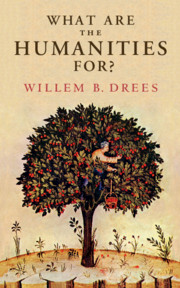Book contents
- What Are the Humanities For?
- What Are the Humanities For?
- Copyright page
- Contents
- Acknowledgments
- Canine, Alien, and Human Humanities
- Part I What Are the Humanities?
- 1 The Humanities
- 2 Understanding Others
- 3 Self-involving
- 4 Responsible Scholarship
- Part II Who Needs the Humanities?
- Selected Literature
- Index
3 - Self-involving
Philosophy and Theology
from Part I - What Are the Humanities?
Published online by Cambridge University Press: 07 May 2021
- What Are the Humanities For?
- What Are the Humanities For?
- Copyright page
- Contents
- Acknowledgments
- Canine, Alien, and Human Humanities
- Part I What Are the Humanities?
- 1 The Humanities
- 2 Understanding Others
- 3 Self-involving
- 4 Responsible Scholarship
- Part II Who Needs the Humanities?
- Selected Literature
- Index
Summary
So far, we have focused on humanities as disciplinary efforts to understand other humans, their lives, languages, and literatures. However, what we learn about others we may apply to ourselves. Our predicament is like that of medical students who learn about diseases patients may have, and in the process start to wonder about their own health. But in the humanities, this self-reflective side is not merely a psychological effect of the knowledge acquired. When we encounter others, we might wonder how am I able to get “into their heads”? Who am I, the one who is engaging those others? Is their way of experiencing the world comprehensible to me? Would it appeal to me? Do their norms apply to me? The humanities involve ourselves as humans, as subjects. If we try to grasp how others experience the social and cultural world, participate in it, and thereby contribute to it, we assume them to be humans, who have inner lives just as we do. In the process, we are involved as humans who bring with us our own assumptions and frames when we create our knowledge of those others.
- Type
- Chapter
- Information
- What Are the Humanities For? , pp. 61 - 93Publisher: Cambridge University PressPrint publication year: 2021



